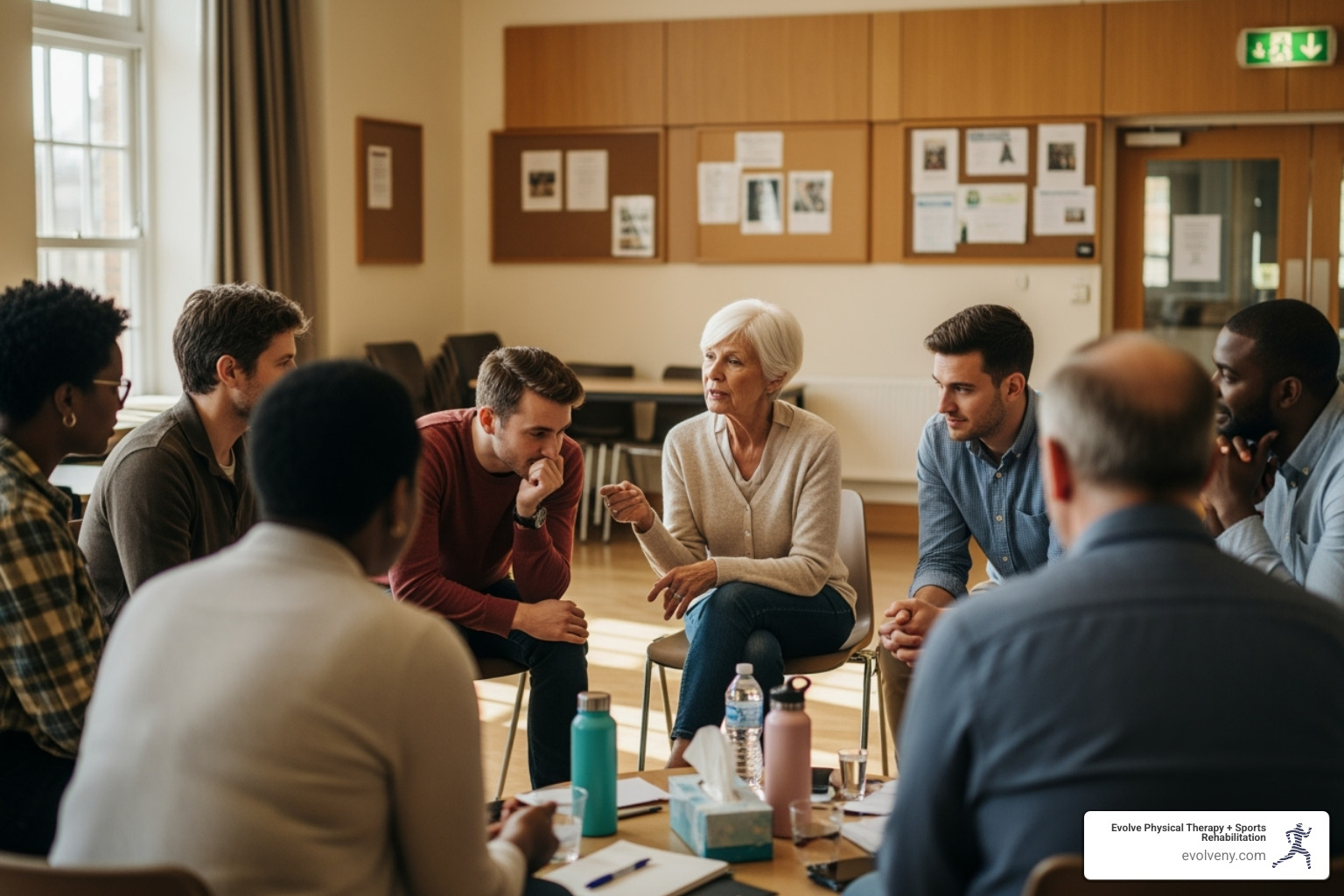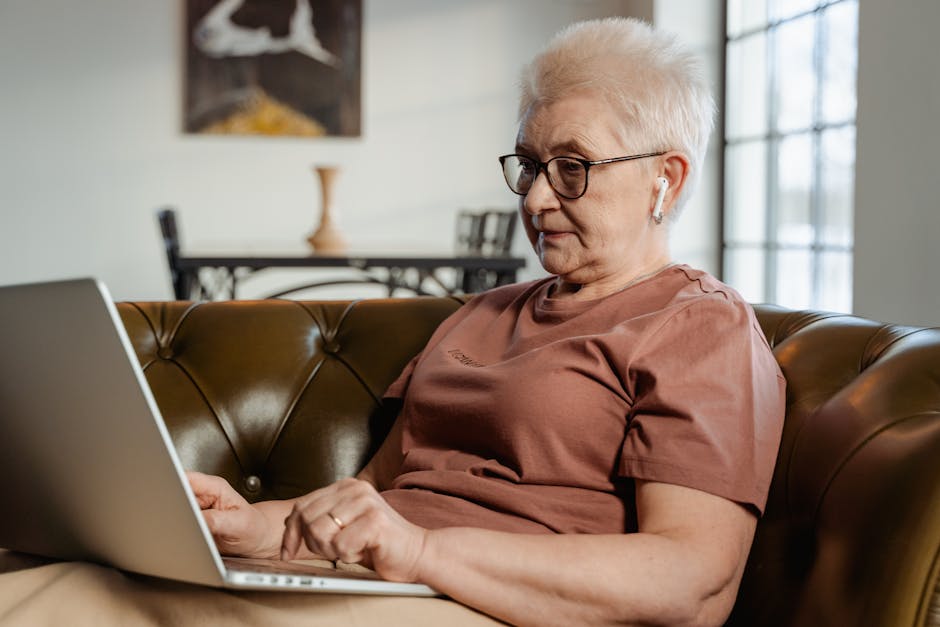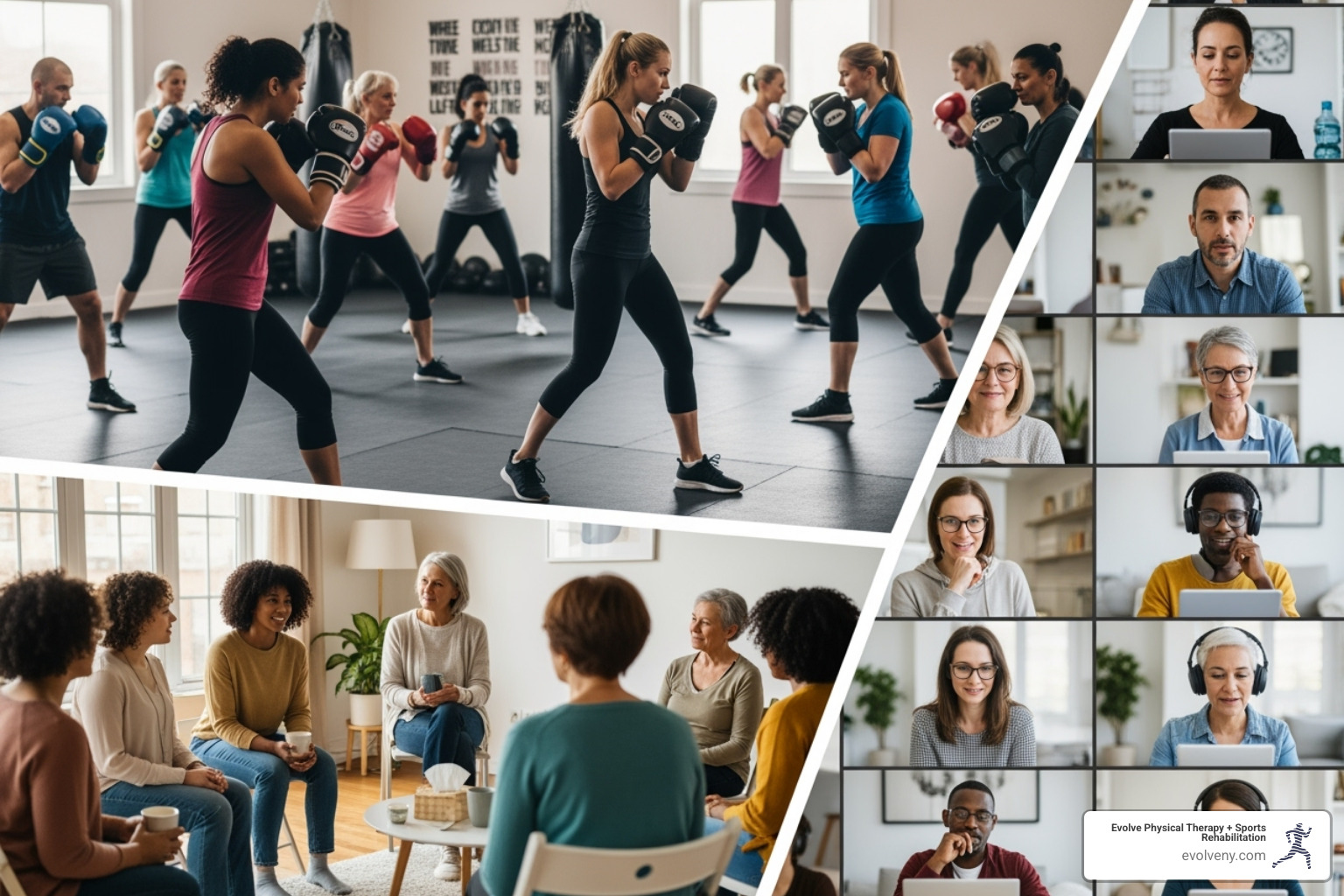Parkinson's Support Groups: Connect, Share, Thrive
Finding Connection and Community Through Parkinson's Support

A Parkinson's disease support group provides a vital lifeline for individuals navigating this complex neurological condition. Here are the most effective ways to find one near you:
Quick Ways to Find Support Groups:
- Ask your neurologist or physician for local recommendations
- Contact the American Parkinson Disease Association (APDA) for chapter locations
- Check with local hospitals for community outreach programs
- Search the Parkinson's Foundation website for nearby resources
- Look in community calendars in local newspapers
Types of Groups Available:
- General support groups for people with Parkinson's
- Caregiver-only support groups
- Young-onset Parkinson's groups
- Women-specific groups
- Online/virtual meeting options
Living with Parkinson's, a progressive neurological disorder, involves more than motor symptoms like tremors. Non-motor symptoms like depression, sleep problems, and cognitive changes can leave individuals feeling isolated.
Support groups help combat this isolation. Research shows these groups are therapeutic, providing a space to share stories, resources, and connect with others who truly understand. As one member shared: "The PD support group gives a place where everyone is going through the same issues and no one judges you, and I’ve made life-long friendships that I wouldn’t have had without this group!"
Beyond emotional support, groups offer practical information on medication, coping strategies, and healthcare. With over 800 groups in the U.S., options range from large meetings to small gatherings.
I'm Lou Ezrick, a physical therapist at Evolve Physical Therapy. I've seen how Parkinson's disease support groups complement medical treatment by providing the community connection essential for thriving with this condition.
The Power of Community: Why Join a Support Group?

When you're living with Parkinson's, the physical challenges can be overwhelming, but the hardest part is often feeling like you're facing it all alone. That's where a Parkinson's disease support group shines. Walking into a room of people who "get it" provides an immediate sense of relief and belonging.
The emotional benefits are profound. Being surrounded by people who understand your daily frustrations without explanation creates powerful connections that combat the isolation and depression that often accompany Parkinson's.
But it's more than emotional validation. Members share practical strategies that improve daily life, from medication timing tips to recommending an exercise routine that helps with balance. This real-world advice is often invaluable. The atmosphere is accepting and encouraging, fostering friendships that extend beyond the meeting room.
Common Topics Discussed in Groups
Every Parkinson's disease support group is unique, but some topics are universal:
- Medication management: Sharing experiences with different drugs, timing strategies, and side effects.
- Symptom tracking: Comparing notes on motor and non-motor symptoms, which helps normalize the experience and offers practical insights.
- Exercise routines: Discussing boxing, dance, or physical therapy exercises that maintain strength and mobility.
- Diet and nutrition: Exchanging tips on managing symptoms like constipation or how food timing affects medications.
- Emotional challenges: Honestly discussing the frustration, grief, and anxiety of living with a chronic diagnosis.
- Other topics: Family dynamics, navigating healthcare, and the latest research news, often with guest speakers like neurologists.
Benefits for Care Partners and Family
Parkinson's affects the entire family, which is why many support groups welcome care partners. Connecting with other caregivers is incredibly healing, as they can share the unique challenges of their role with people who truly understand.
These connections help reduce caregiver burnout by showing you're not alone in feeling overwhelmed. Other care partners offer practical advice, emotional support, and permission to practice self-care. For families seeking more resources, we have detailed information on caregiver support groups. These groups create extended families who understand your journey and are invested in your wellbeing.
How to Find the Right Parkinson's Disease Support Group

Finding the right Parkinson's disease support group can take time. Not every group will be the perfect fit, so don't be discouraged if you need to try a few. Some are large and formal, others small and informal. Your neurologist or physician is a great starting point for recommendations, as are local hospitals and community centers.
Finding Local and In-Person Groups
Face-to-face connection can be a powerful comfort. For many, in-person groups become a lifeline.
- National organizations are your best bet for finding established groups. The American Parkinson Disease Association (APDA) and the Parkinson's Foundation have local chapters across the country. You can find a local APDA chapter or find a Parkinson's Foundation chapter through their websites.
- Medical centers and movement disorder clinics often run their own support groups and may feature guest speakers like neurologists or physical therapists.
- Local community calendars in senior centers, libraries, and newspapers can also list ongoing support groups.
Before you go, call the organizer to ask about the group's format and if they welcome drop-ins.
Exploring Online and Virtual Communities
Online communities offer incredible flexibility and accessibility, especially for those with mobility challenges or who live in remote areas. They provide 24/7 support and connect you with a wider community than you might find locally.
- The Parkinson's Buddy Network from the Michael J. Fox Foundation is a great online community for making connections.
- Online forums like NeuroTalk offer robust discussions on specific topics.
- Facebook groups are also popular; ask your doctor for recommendations.
For a comprehensive list of options, see our guide to Online Support Groups for Parkinson's Disease. The flexibility of online groups allows you to participate whenever it works for your schedule, which can be a game-changer.
How to Start Your Own Parkinson's Disease Support Group
If you can't find a group that fits your needs—perhaps for young professionals or caregivers—consider starting your own. It can be incredibly rewarding.
- Identify the need: Define the specific audience or focus for your group (e.g., newly diagnosed, caregivers, exercise-focused).
- Handle the logistics: Choose a convenient location and time. Community centers, libraries, or churches often have low-cost meeting rooms.
- Decide on a format: Will meetings be structured with topics and guest speakers, or informal sharing circles?
- Spread the word: Use flyers in neurologists' offices and community centers. Create a social media page and contact local APDA or Parkinson's Foundation chapters for help with promotion.
Your role is to facilitate connection, not give medical advice. For more detailed guidance, see our guide on how to form a support group.
Types of Support Available

The Parkinson's disease support group community has evolved to meet a wide range of needs. No two groups are identical, allowing you to find one that fits your specific situation.
- General support groups are open to anyone with a Parkinson's diagnosis, offering a mix of experiences from the newly diagnosed to those who have managed the condition for years.
- Caregiver-only groups provide a vital outlet for spouses, adult children, and others to share frustrations and tips without worrying about being overheard by their loved one.
- Combined groups welcome both individuals with Parkinson's and their care partners, fostering mutual understanding and shared learning.
- Young-Onset Parkinson's Disease (YOPD) groups serve those diagnosed before age 50, addressing unique concerns like careers and raising young children.
- Women with Parkinson's groups focus on how women may experience the condition differently, from hormonal influences to medication responses.
- Atypical Parkinsonism groups support those with related but distinct conditions like Progressive Supranuclear Palsy (PSP), Multiple System Atrophy (MSA), and Lewy Body Dementia (LBD).
- Treatment-specific groups offer targeted discussions for those considering or using therapies like Vyalev or Duopa.
Special interest groups that combine support with activities like exercise, music, or art are also available, proving that support can happen anywhere.
Beyond Talk: Holistic Approaches to Living Well with Parkinson's
While Parkinson's disease support groups provide crucial emotional support, living well with the condition requires a comprehensive approach. The most successful individuals combine community support with proactive strategies like exercise and integrated therapies to maintain their quality of life.
At Evolve Physical Therapy, we see this integrated approach work every day. Patients who commit to both support groups and comprehensive care show better outcomes. For more details, visit our page on Parkinson's Disease.
The Critical Role of Exercise and Physical Therapy
Exercise is absolutely critical for Parkinson's. Research shows regular physical activity can slow symptom progression while improving balance, mobility, and mood. It's one of the most powerful tools available.
Physical therapy provides targeted, specialized interventions. At Evolve Physical Therapy, our hands-on method is customized to each person's needs. One highly effective program is Rock Steady Boxing, a non-contact fitness regimen designed for people with Parkinson's. It improves balance, speed, and strength while building community. We're proud to offer these classes at our Brooklyn location. You can learn more at Rock Steady Boxing for Parkinson's Disease NYC and read our article on Parkinson's Boxing Classes.
Staying Informed on Research and Clinical Trials
The world of Parkinson's research is moving fast, offering hope for better treatments. Clinical trials are crucial to this progress. Participating gives you access to cutting-edge treatments and helps the entire Parkinson's community. If you're interested, the Michael J. Fox Foundation provides an excellent resource to find information about clinical trials, allowing you to search for studies based on your location and symptoms.
Legal and Financial Considerations
Planning for the future is essential. Addressing legal and financial matters early gives you control and peace of mind.
- Financial planning includes understanding insurance, planning for future care, and exploring disability benefits.
- Legal planning involves creating documents like power of attorney and advanced directives to ensure your wishes are honored.
- Navigating insurance and understanding Medicare or long-term care options can save significant stress.
- Disability benefits may be available if symptoms affect your ability to work.
Consulting with experts who understand chronic illness helps create a plan that protects you and your loved ones. Early planning is one of the most caring things you can do.
Frequently Asked Questions about Parkinson's Support Groups
We understand that taking the first step toward joining a Parkinson's disease support group can feel overwhelming. Over the years, we've heard many of the same concerns and questions from individuals considering this important step. Let us address some of the most common worries that might be holding you back.
What if I'm an introvert or don't like the first group I try?
If you're naturally introverted or feeling anxious about group settings, you're definitely not alone. Many people worry about feeling out of place or being pressured to share personal details before they're ready. The good news is that support groups come in all shapes and sizes – from large, formal meetings with structured presentations to cozy "living-room" style gatherings with just a handful of people.
There's absolutely no pressure to share your story right away. In fact, many group members find that simply listening to others' experiences provides tremendous comfort and insight. You might find that the person sitting quietly in the corner is gaining just as much from the group as someone who speaks frequently.
If the first group doesn't feel right, don't give up. It's completely normal to try several different groups before finding your perfect fit. Think of it like shopping for a comfortable pair of shoes – sometimes you need to try on a few pairs before you find the ones that feel just right. The format, the people, and even the meeting time can make a huge difference in how comfortable you feel.
Are online support groups as effective as in-person ones?
This is such a practical question, especially for those dealing with mobility challenges or living in areas where in-person groups aren't readily available. Online support groups offer incredible flexibility – you can participate from the comfort of your own home, at any time that works for your schedule and energy levels.
Virtual communities provide 24/7 connection to a much wider network of people who understand exactly what you're going through. When you're having a difficult night with symptoms, or when you have a question at an odd hour, online forums and groups can be a lifeline. Many people find that the ability to think through their responses and participate at their own pace actually makes online groups less intimidating than face-to-face meetings.
The effectiveness really depends on what you're looking for. In-person groups offer the warmth of immediate human connection – the ability to see facial expressions, share a laugh, or even get a reassuring hug. Online groups excel at convenience, accessibility, and connecting you with specialized communities you might never find locally.
Many people find the best approach is using both formats. You might join a local group for that face-to-face connection while also participating in online communities for ongoing support and information sharing. The most important thing is finding the type of support that helps you feel less isolated and more empowered.
What is the difference between a support group and a therapy group?
This distinction is really important to understand, as both serve valuable but different purposes in your overall care plan. A Parkinson's disease support group is typically run by peers – people who are living with Parkinson's themselves or caring for someone who is. These groups focus on sharing real-life experiences, practical tips, and mutual encouragement.
Support groups are usually less structured and more conversational. You might discuss everything from medication timing to exercise routines to family dynamics, all guided by what the group members want to talk about. The power comes from knowing that everyone in the room truly understands your challenges because they're facing similar ones.
Therapy groups, on the other hand, are led by licensed mental health professionals like psychologists or social workers. These groups are more structured and focused on specific therapeutic goals, such as processing grief, managing depression, or developing coping strategies for anxiety. The leader uses clinical techniques to guide discussions and help participants work through emotional challenges.
Both types of groups can be incredibly beneficial, and many people participate in both. A support group might help you learn practical strategies for managing daily life with Parkinson's, while a therapy group might help you process the emotional impact of your diagnosis. Think of them as complementary tools in your toolkit for living well with Parkinson's disease.
Conclusion
Living with Parkinson's disease can be challenging, but remember: you are not alone. A Parkinson's disease support group can transform your experience from one of isolation to one of connection and hope.
The benefits are real and life-changing, from the emotional validation of being understood to the practical tips that make life easier. Connection is the key ingredient. It provides a wellspring of collective wisdom, strength, and encouragement.
Support comes in many forms, from in-person meetings to online communities. Taking that first step can feel intimidating, but finding the right fit is worth the effort.
A holistic approach that includes exercise and physical therapy is also essential for maintaining independence and quality of life. At Evolve Physical Therapy, our community approach recognizes that healing happens best when you're surrounded by support and specialized care. Combining peer support with targeted physical therapy creates a powerful foundation for living a full and meaningful life.
If you're ready to see how specialized physical therapy can complement your support group experience, we're here to help. Learn more about specialized Parkinson's physical therapy in Brooklyn and find how our comprehensive approach can support your journey.

